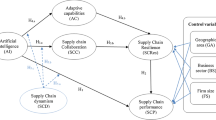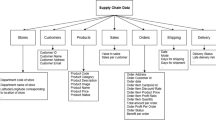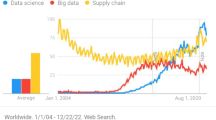Abstract
Today’s business environment is very different from that of the past. New and innovative measures need to be found in order to optimize production and operations management in supply chain systems. Several emerging issues, such as risk and uncertainty management, environmental sustainability, optimal strategies under competition, sophisticated incentive alignment schemes, and optimal operations with strategic consumer behaviors, are critical to the success of modern supply chain management. This introduction provides a concise review of these critical research issues and introduces the related papers featured in this special volume.
Similar content being viewed by others
Notes
A supply chain is called “coordinated” if its agents will make their decision (e.g., on inventory) the same as the supply chain’s “globally optimal” decision.
References
Agrawal, V., & Seshadri, S. (2000). Risk intermediation in supply chains. IIE Transactions, 32, 819–831.
Ashby, A., Leat, M., & Hudson-Smith, M. (2011). Making connections: A review of supply chain management and sustainability literature. Supply Chain Management: An International Journal, 17, 497–516.
Beske, P., & Seuring, S. (2014). Putting sustainability into supply chain management. Supply Chain Management: An International Journal, 19, 322–331.
Buzacott, J., Yan, H., & Zhang, H. (2011). Risk analysis of commitment-option contracts with forecast updates. IIE Transactions, 43, 415–431.
Cachon, G. (2003). Supply chain coordination with contracts. In S. Graves & T. de Kok (Eds.), Handbooks in operations research and management science: Supply chain management (pp. 229–340). Amsterdam: North Holland.
Cachon, G. P., & Netessine, S. (2014). Game theory in supply chain analysis. INFORMS tutorials in operations research (pp. 200–233).
Chen, Y. F., & Yano, C. A. (2010). Improving supply chain performance and managing risk under weather-related demand uncertainty. Management Science, 56, 1380–1397.
Chen, Y. J., & Seshari, S. (2005). Supply chain structure and demand risk. Automatica, 42, 1291–1299.
Chiu, C. H., Choi, T. M., & Tang, C. S. (2011). Price, rebate, and returns supply contracts for coordinating supply chains with price dependent demands. Production and Operations Management, 20, 81–91.
Choi, T. M. (2011). Coordination and risk analysis of VMI supply chains with RFID technology. IEEE Transactions on Industrial Informatics, 7, 497–504.
Choi, T. M., & Chiu, C. H. (2012b). Risk analysis of stochastic supply chains: A mean-risk approach. New York: Springer.
Choi, T. M., Chiu, C. H., & Fu, P. (2011). Periodic review multi-period inventory control under a mean-variance optimization objective. IEEE Transactions on Systems, Man, and Cybernetics, Part A Systems and Humans, 41, 678–682.
Dong, L., & Tomlin, B. (2012). Managing disruption risk: The interplay between operations and insurance. Management Science, 58, 1898–1915.
Du, P., & Chen, Q. (2014). Skimming or penetration: Optimal pricing of new fashion products in the presence of strategic consumers. Annals of Operations Research. doi:10.1007/s10479-014-1717-0.
Gan, X., Sethi, S. P., & Yan, H. (2004). Coordination of supply chains with risk-averse agents. Production and Operations Management, 13, 135–147.
Li, Q., Li, B., Chen, P., & Hou, P. (2015). Dual-channel supply chain decisions under asymmetric information with a risk-averse retailer. Annals of Operations Research,. doi:10.1007/s10479-015-1852-2.
Martinez-Jurado, P. J., & Moyano-Fuentes, J. (2014). Lean management, supply chain management and sustainability: A literature review. Journal of Cleaner Production, 85, 134–150.
Martinez-de-Albeniz, V., & Simchi-Levi, D. (2006). Mean-variance trade-offs in supply contracts. Naval Research Logistics, 53, 603–616.
Rebs, T., & Brandenburg, M. (2015). Sustainable supply chain management: A modelling perspective. Annals of Operations Research, 229, 213–252. doi:10.1007/s10479-015-1853-1.
Sodhi, M. S., Son, B. G., & Tang, C. S. (2012). Researchers’ perspectives on supply chain risk management. Production and Operations Management, 21, 1–13.
Sodhi, M. S., & Tang, C. S. (2012). Managing supply chain risk. New York: Springer.
Su, X., & Zhang, F. (2008). Strategic customer behaviour, commitment, and supply chain performance. Management Science, 54, 1759–1773.
Tang, C. S. (2006). Perspectives in supply chain risk management. International Journal of Production Economics, 103, 451–488.
Xiao, T., & Choi, T. M. (2009). Purchasing choices and channel structure strategies for a two-echelon system with risk-averse players. International Journal of Production Economics, 120(54–65), 2009.
Yang, D., Qi, E., & Li, Y. (2015). Quick response and supply chain structure with strategic consumers. Omega, 52, 1–14.
Zsidisin, G. A., & Ritchie, B. (2008). Supply chain risk. New York: Springer.
Acknowledgments
The guest editors sincerely thank the Editor-in-Chief, Professor Endre Boros, and Publication Manager, Katie D’Agosta, for providing excellent advice and support with the organization of this very important special volume. The guest editors would like to express their hearty thanks for Layth Alwan’s kind help and comments during the development of this special volume. Finally, the guest editors are indebted to all referees for their constructive, timely, and valuable review feedbacks on the manuscripts. They also thank all authors for their high quality contribution.
Author information
Authors and Affiliations
Corresponding author
Additional information
An Editorial Article for the Special Issue of Emerging Production Optimization Issues in Supply Chain Systems in Annals of Operations Research.
Rights and permissions
About this article
Cite this article
Choi, TM., Wang, M. & Yue, X. Emerging production optimization issues in supply chain systems. Ann Oper Res 240, 381–393 (2016). https://doi.org/10.1007/s10479-015-1948-8
Published:
Issue Date:
DOI: https://doi.org/10.1007/s10479-015-1948-8




